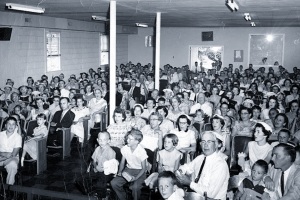Liberal, R.I.P.: A Grievous Obituary
The noble word "Liberal" has died at the hands of executioners, full of years, but far too soon.
A pretender has risen in its place, lurking and laughing Gollum-like behind the tombstones even as the corpse of the esteemed term, "Liberal," is borne to its resting place.
We cannot help but note the distinguished and memorable names of other assassinated words chiseled into the monuments we pass: "Righteousness," "Progressive," "Gay," "Tolerant," "Republic," "Freethinker," "Freedom of Speech," "Diversity," "Religious Freedom," "Rainbow," "Public Policy," "Equality," to name a few.
All have been taken by pretenders who have executed the true meanings and replaced them with semantic mutants. So the would-be claimant to the good name "Liberal" frolics behind the headstones with the rest. The pretender not only derides, but cloaks its own deceits in its claim as the rightful heir of the rich liberal tradition.
Occasionally, a fetid cemetery breeze sweeps away the smoke, and we see the pretender as it is, in all the monstrosity of Gollum, believing himself the true possessor of the Ring, or, in this case, the good name "Liberal."
And that brings us to the case of Mozilla CEO Brendan Eich, and (as John Fund reminds us in National Review) Angela McCaskill of Gallaudet University (from which she earned a Ph.D.), Scott Eckern, artistic director of the California Musical Theater, Los Angeles restaurateur Marjorie Christofferson, and many others. Even Barack Obama might have been among the enemies of the word-murderers had they not given him a free pass.
They all have in common their opposition either presently or – as in the case of President Obama, the past – of same-sex marriage (I will let the word "gay" lie in dignity in its grave), and their firing from their jobs by pretenders to liberal thought and expression.
Some may think there can never be good in the "Liberal" designation, that "good" and "liberal" are oxymorons. To them, all that is liberal is evil, and always has been. Such naysayers only reveal that they don't know the history of the noble term, "Liberal."
Every person today who wants to "conserve" the inherent value of human life and the dignity of the individual from conception to the grave, free speech and expression, private property and the responsibility for its defense would have in another time been tagged a "liberal."
Edmund Burke, the 18th century Irishman and member of the British Parliament, is noted as the founder of political conservatism. As Linda Raeder of the National Humanities Institute points out, Burke was not a philosopher, and yet, she writes, "he embraced a consistent political creed that governed his actions throughout his life."
F.A. Hayek, famous "conservative" economist, and author of the anti-socialist classic, The Road to Serfdom, shared Burke's creed, which Raeder describes as "classical liberalism." They embraced principles like limited government, free markets, and freedom of belief and expression, all prime values in classical liberalism.
Feisty American revolutionary Tom Paine was, in some ways, the spiritual ancestor of the pretenders today. He hoped Burke's liberalism and Irish heart would make Burke an avid fan of the French Revolution. Burke's form of liberalism instead made him a vocal opponent of the chaotic mobocracy ruling the Paris streets.
Burke could discern that they were anything but "liberal" and that their cries for liberte were actually demands for anarchy, their calls for egalite was what we term today egalitarianism, and their pleas for fraternite really meant conformity to the mob.
So the pretenders today often stand for the opposite of classical liberalism – expanded government, as well as limitations on belief and expression, as the Brendan Eich and other cases show. In fact, contemporary pretenders to the Liberal label are more prone to the mob strategy of the French Revolution that Burke and true liberals saw through.
Current pretenders, like the vicious crowds convinced that Marie Antoinette really did say "let them eat cake," are the true reactionaries. Classical liberalism demands reason, reflection, and careful thought, all in civilizational context. But the pretenders pile on at the first ripple that someone has dared to act upon values other than those imposed by political correctness. The semantic executioners redefine anarchic rush as valiant crusading, and the unfortunates who defy their mandates are the enemy against whom the brave warriors must strike.
Classical liberalism was not anti-history, in contrast to the contemporary pretenders to the Liberal mantle. Burke believed, and Hayek affirmed that historical tradition was vital in the formation of morality and sound thinking. They felt society should respect "inherited values" reflecting high ethical standards.
The fine art of redefinition began in the Garden of Eden. "Did God really say that?" asked the serpent, as Adam and Eve told him of the Lord's prohibition of the tree of the knowledge of good and evil. Twentieth-century literary deconstruction taught us the modern version, and 21st century postmodernism added the relativistic twist: "words are not about any absolute meaning, but what they mean to you."
By that standard the assassins of "Liberal" have been able to pull off the incredible stunt of being notoriously illiberal, to the point of the destruction of people's reputations and careers, all the while being hailed as the paragons of liberalism in our time.
Some trick.
The clue that semantic hocus-pocus is trying to bamboozle us is in the suffix, "ism." Scientism pretends to be real science, Christianism feigns authentic Christianity, and modern liberalism tries to pass itself off as truly "Liberal."
No wonder the Apostle John warns us to "test the spirits." (1 John 4:1). That includes the big principalities that conjure the zeitgeist, the spirit of the age. It takes much discernment to live in our times, when many are ever learning but never coming to a knowledge of the truth (2 Timothy 3:7), and when fables and delusions abound.
Discernment is essential lest we find ourselves unwittingly caught up in the mob, bearing good words to the guillotine, where they are severed from historic meaning, and replaced with ghoulish mutants that try to resemble the original even while expressing the opposite.
Everything begins with the true Word, writes John. Unless we discern the trickery, everything could end with the mutant word.




























